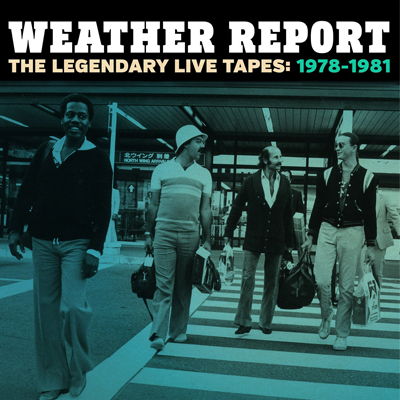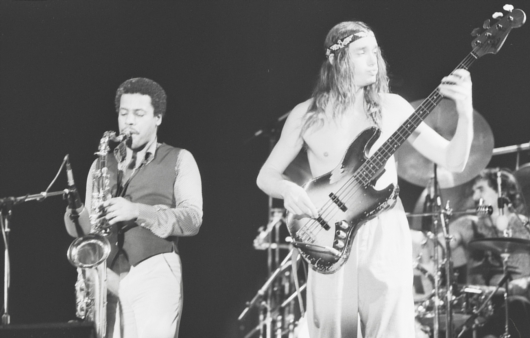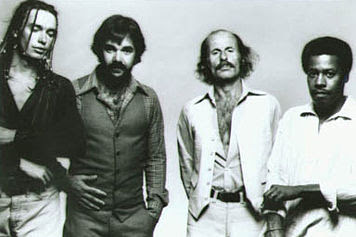I got to meet Pat Metheny once, when I was working for my college radio station, back in ’89 or so. Nice enough guy—after the show, he was surrounded by student musicians and jazz geeks and signed everything put in front of him, answered every question. I was there to get him to record a station ID—”Hi, I’m Pat Metheny, and for the best in jazz fusion, listen to …” yada-yada. Pretty simple gig. Simple enough for a nice, large-haired guitarist to pull off, to make nice with the college and community and all.
He wouldn’t do it. Wasn’t mean about it, but was pretty adamant. After a moment of negotiation, he agreed to speak into my mic, if I would change the script—”For the best in jazz, listen to …” Wouldn’t say the word fusion. At the time, he was touring behind his Letter from Home album, a pleasant enough, Brazilian-infused collection that, while certainly a jazz record, was not a straightforward, acoustic post-bop record, the kind of fine-but-catholic recordings that seemed to be the standard for critically accepted jazz albums at the time. Letter from Home blended disparate but compatible stylistic elements into a beautiful, coalescent whole. Isn’t that what fusion, by definition, is? But still he declined. Wouldn’t even say the word.
 I was reminded of this while reading the liner notes to the honestly astounding new Weather Report box set The Legendary Live Tapes: 1978-1981 (Columbia/Legacy), when drummer Peter Erskine (author of said notes) recalled founding keyboardist Joe Zawinul’s similar reticence to embrace the fusion label (”We don’t fuse nothin’,” he is said to have declared). It’s a sentiment I understand now, having listened to the many jewels collected in the set, for although the band did meld together a panoply of divergent sounds, textures, and stylistic moves, they were at heart and in practice a jazz band, with every related essential ingredient and accoutrements of such represented in full, virtuosic glory. That’s easy to forget sometimes, particularly when one is chiefly concerned with whether the instruments are plugged in or miked, or when one cannot quite see the stage to determine why the bass player has laid his instrument on the floor to play it.
I was reminded of this while reading the liner notes to the honestly astounding new Weather Report box set The Legendary Live Tapes: 1978-1981 (Columbia/Legacy), when drummer Peter Erskine (author of said notes) recalled founding keyboardist Joe Zawinul’s similar reticence to embrace the fusion label (”We don’t fuse nothin’,” he is said to have declared). It’s a sentiment I understand now, having listened to the many jewels collected in the set, for although the band did meld together a panoply of divergent sounds, textures, and stylistic moves, they were at heart and in practice a jazz band, with every related essential ingredient and accoutrements of such represented in full, virtuosic glory. That’s easy to forget sometimes, particularly when one is chiefly concerned with whether the instruments are plugged in or miked, or when one cannot quite see the stage to determine why the bass player has laid his instrument on the floor to play it.
Although some 30 different musicians could claim onetime membership in Weather Report during its roughly 16 years of existence (and each of its lineups had plenty to recommend it), the band on this box is the one you want to hear—the core quartet of Zawinul, co-founding saxophonist Wayne Shorter, drummer Erskine, and bassist Jaco Pastorius, the band’s resident rock star and evil magus. It’s the lineup that recorded Mr. Gone (1978), and the excellent live collection 8:30 (1979); and all but Erskine were front-and-center for Heavy Weather (1977), as well—that one featured ”Birdland” and ”Teen Town,” the two Weather Report tracks you’re likely to have heard, even if you don’t know who Weather Report were.
The recordings on the box set come from a variety of sources, but mostly from uncirculated soundboard tapes and audience recordings. Regardless of source, these 30 tracks find the band at its absolute peak, playing powerful music with intelligence, flair, and virtuosity.
 Highlights are many and varied. One particular mind-blower is a June, 1978 recording of ”Gibraltar,” a track from the band’s 1976 (pre-Pastorius) album Black Market. An already expansive and dynamic eight minutes on record, the band blows open the live arrangement to an epic 21 minutes, breaking from the main themes of the piece to allow for soloists to pair off and dance together (Shorter and Pastorius’ bit around the 8:00 mark is particularly inspired). Zawinul also shines, breaking out his usual range of synth sounds—glassy electric piano during quiet parts; squiggly, bassy beast noises during the faster, louder sections. The best portions of the song, however, happen when the band comes together after a digression, playing with controlled abandon. It’s hard to believe this was Erskine’s second show with the band; he locks in effortlessly.
Highlights are many and varied. One particular mind-blower is a June, 1978 recording of ”Gibraltar,” a track from the band’s 1976 (pre-Pastorius) album Black Market. An already expansive and dynamic eight minutes on record, the band blows open the live arrangement to an epic 21 minutes, breaking from the main themes of the piece to allow for soloists to pair off and dance together (Shorter and Pastorius’ bit around the 8:00 mark is particularly inspired). Zawinul also shines, breaking out his usual range of synth sounds—glassy electric piano during quiet parts; squiggly, bassy beast noises during the faster, louder sections. The best portions of the song, however, happen when the band comes together after a digression, playing with controlled abandon. It’s hard to believe this was Erskine’s second show with the band; he locks in effortlessly.
Another surprise is an exploratory take on 1980’s ”Port of Entry” (from Night Passage), recorded in London that same year, with Robert Thomas, Jr. joining the quartet on percussion. According to Erskine’s liner notes, the band had not settled on an arrangement of this Shorter composition, and the coiled precision of the recorded version opens up into a much more dynamic, livelier performance. The result is jarring for those familiar with the song in its originally recorded form, but jarring in the most exciting, extraordinary way.
Familiar songs like ”Birdland,” ”Teen Town,” and (my personal favorite Weather Report song) ”A Remark You Made” are rendered in straightforward arrangements, while ”River People” gets somewhat recast, with an elegiac Pastorius composition, ”Continuum,” serving as a quiet prelude, before the propulsive Mr. Gone highlight gets rolling, with the pulse of the bass and Zawinul and Shorter’s call-and-response instrumental conversation. The audience recording here is a little rough, but like any decently recorded bootleg, it makes one feel as though he/she is in the middle of the audience, which, for this show, is an easy thing to wish for.
There is plenty of space given to solo performances in the box set, as well. Shorter’s spot is fanciful and engaging, though the buzz of the audience recording (from Rochester, NY, in 1981) is a bit distracting. Erskine’s solo is a series of fills and rolls, and could easily have been excised from the running order without missing much. Pastorius’ solo from Osaka in 1980 is predictably unpredictable. A lyrical opening gives way to fingerpicking, almost as a folk guitarist would play. This segues into a funk riff, then back to the fingerpicking. Then, oddly, a symphony recording begins playing, and Pastorius solos over that, adding a countermelody before sliding once again into funk and a delay effect-enabled ”duet” with himself. This is mood music for those with short attention spans; just as he locks into a groove or melody, he changes it up, as if discarding the idea in favor of a new favorite.
 Ultimately, though, if there were one track on the box set that best exemplifies this lineup of Weather Report—a tall order, to be sure, but what the hell—it’s Shorter’s ”Elegant People,” another Black Market cut from the same 1978 show that produced the aforementioned version of ”Gibraltar.” In this performance, each member of the quartet occupies his own improvisational space, spinning in his own orbit, yet the band holds it all together. Erskine, in particular, seems like he’s rolling downhill; he leaves no empty air in the rhythm, punctuating every off-beat with fills, ride cymbal, and well-place rim hits. Shorter goes off into deep-space exploration, his improvisation bouncing off Zawinul’s synth bottom and veering off into the ether. This performance is illustrative of how disparate pieces can coalesce into a magnificent whole.
Ultimately, though, if there were one track on the box set that best exemplifies this lineup of Weather Report—a tall order, to be sure, but what the hell—it’s Shorter’s ”Elegant People,” another Black Market cut from the same 1978 show that produced the aforementioned version of ”Gibraltar.” In this performance, each member of the quartet occupies his own improvisational space, spinning in his own orbit, yet the band holds it all together. Erskine, in particular, seems like he’s rolling downhill; he leaves no empty air in the rhythm, punctuating every off-beat with fills, ride cymbal, and well-place rim hits. Shorter goes off into deep-space exploration, his improvisation bouncing off Zawinul’s synth bottom and veering off into the ether. This performance is illustrative of how disparate pieces can coalesce into a magnificent whole.
Hearing it, one could be swayed to agree with Zawinul—this is not fusion, per say; it is, simply, jazz—jazz as music, yes, but also jazz as language, a tongue that is often most eloquently spoken when multiple conversations are going on at once. That might have been the great gift of this particular Weather Report lineup, particularly in the live setting. That The Legendary Live Tapes enables us to eavesdrop on these conversations is a fortunate circumstance, indeed.





Comments